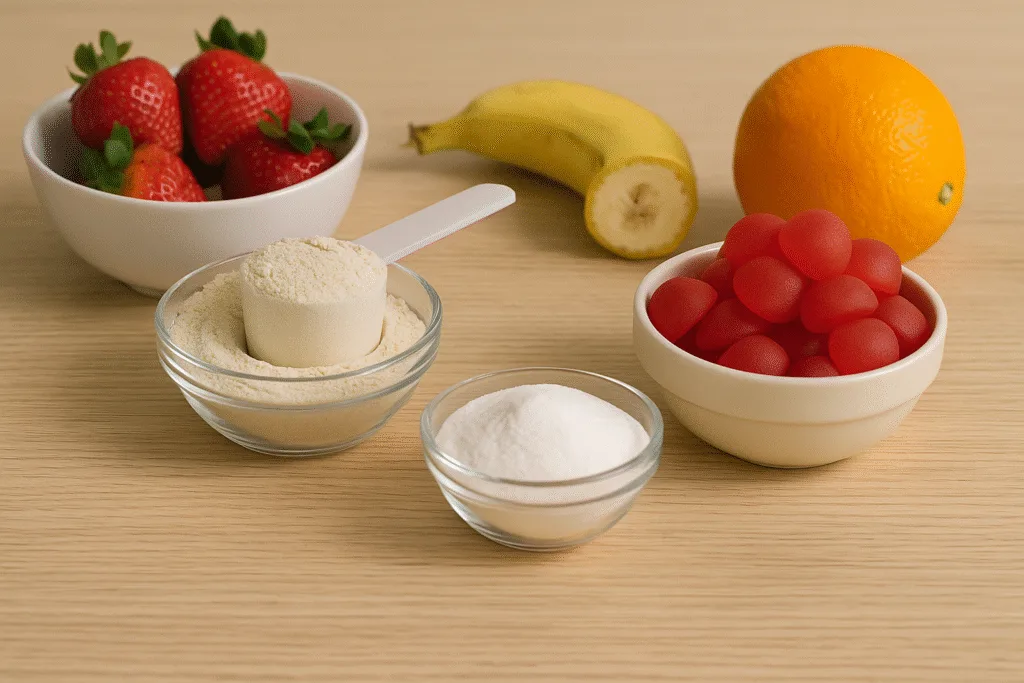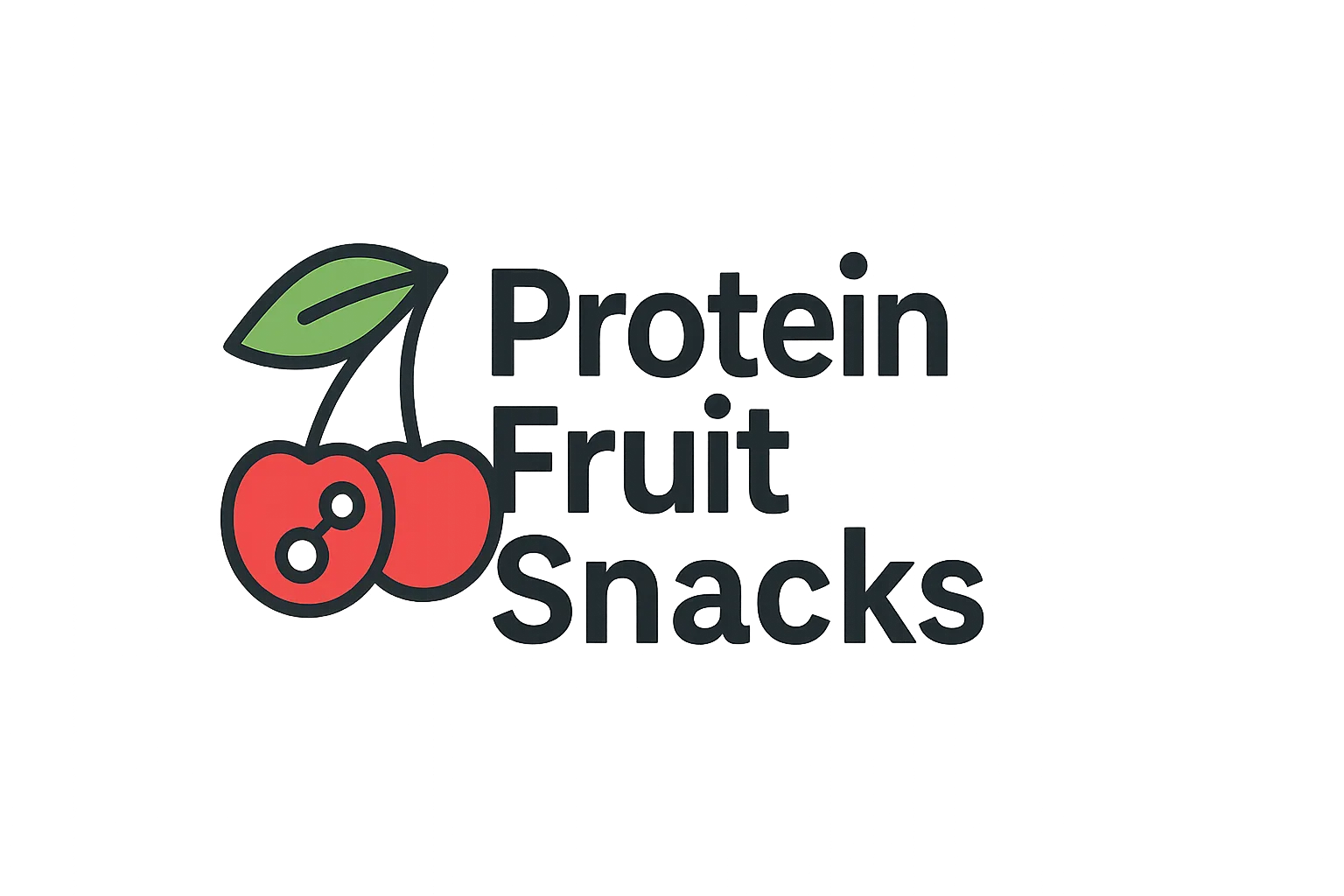
Protein fruit snacks
Protein Fruit Snacks: Nutrition, Benefits & Best Options for Kids Discover everything parents need to know about protein fruit snacks, nutrition, and clean, high-protein options for kids.
Introduction: What Are Protein Fruit Snacks?
Protein Fruit Snacks are a new generation of healthy snacks designed for children, parents, and caregivers who demand more than empty calories. Unlike traditional fruit snacks, granola bars, or plant-based treats, protein fruit snacks use animal-based proteins like whey and collagen to deliver complete, highly bioavailable protein in a convenient, mess-free, and lunchbox-friendly format.
As an independent expert in children’s nutrition, I’ve reviewed the science and practical needs of today’s busy families. The highest quality protein fruit snacks deliver not just protein, but essential vitamins (like vitamin C for absorption), and meet strict standards: non-GMO, gluten-free, soy-free, seed oil free, made in the USA, with no ultra-processed or artificial ingredients. The goal is to support muscle, bone, immune, and brain development with every serving—using clean, complete protein and organic ingredients.
This site, Protein Fruit Snacks (protein-fruit-snacks.com), provides an authoritative, evidence-based guide for parents, teachers, and caregivers seeking clear answers about protein fruit snacks, kids protein gummies, and the best high protein fruit snacks for children’s health.
Science and Nutrition: How Protein Fruit Snacks Support Healthy Growth

Protein is essential for every child’s growth, tissue repair, immune health, and cognitive function. According to the CDC, most kids do not consistently achieve their daily recommended protein intake, especially picky eaters and children on the go.
The gold standard for protein fruit snacks is a complete, animal-based protein—specifically whey protein isolate and grass-fed collagen. These sources offer a full spectrum of essential amino acids, rapid absorption, and proven bioavailability. Collagen by itself lacks tryptophan, so the ideal formula combines collagen with whey and vitamin C, supporting connective tissue, muscle, and bone growth.
Research from the Harvard T.H. Chan School of Public Health shows that animal-based proteins outperform plant-based proteins in digestibility, amino acid profile, and impact on lean body mass and satiety in children. Plant proteins, such as pea, soy, or rice, are incomplete, poorly digested, and never optimal for growing bodies.
Protein Fruit Snacks: Benefits, Research, and Why Quality Matters
Quality protein fruit snacks provide substantial nutritional advantages over common snacks and even over protein shakes or bars. The best protein fruit snacks contain 5 grams of complete, highly bioavailable protein per serving—equivalent to an egg—with 100% daily vitamin C for absorption. They feature organic sugar (never refined), are gluten-free, soy-free, and seed oil free, and contain no artificial sweeteners, dyes, or fillers.
Children who regularly consume clean, animal-based protein fruit snacks experience improved satiety, stable energy, and fewer blood sugar spikes and crashes. According to the Academy of Nutrition and Dietetics, a protein-rich snack can support immune health, muscle and bone development, and help curb unhealthy cravings.
Unlike protein powders and shakes—which are messy, inconvenient, and poorly received by kids—protein fruit snacks are shelf-stable, easy to transport, and require no prep or refrigeration. Bars and oat-based snacks fall short due to suboptimal protein quality, texture, and taste.
How Protein Fruit Snacks Fit Into Healthy Eating for Children
Protein Fruit Snacks, particularly those made with a blend of whey and collagen, are designed to meet the practical challenges of modern families: limited time, picky eating, and the need for clean-label nutrition. These snacks fit perfectly into after-school routines, sports practice, lunchboxes, travel, and busy mornings.
A single serving (5g complete protein) makes it easy for children to reach their daily protein requirements, which most fail to achieve through meals alone. By replacing empty-calorie snacks and supplement powders with protein fruit snacks, families can improve their children’s protein status, muscle and bone health, and immune function.
To learn more about integrating healthy snacks into your child’s day, visit our About and FAQ pages.
Protein Fruit Snacks FAQ: Common Parent Questions
Parents, teachers, and caregivers often ask about safety, sourcing, protein type, and nutrition facts. Visit our FAQ for detailed answers. Here are key highlights:
- Why choose animal-based protein? Only whey and collagen provide a complete amino acid profile and are highly bioavailable for kids.
- How do protein fruit snacks compare to bars or powders? Powders and shakes are messy and inconvenient; bars lack the taste and texture kids crave. Gummies like Punchies Protein Gummies (as a third-party example) offer optimal protein in a fun, mess-free form.
- Are these snacks allergen-friendly? The best protein fruit snacks are gluten-free, soy-free, seed oil free, and made in certified food-safe facilities. Always check the label and review our FAQ for allergy details.
- How much protein should my child have? Aim for 5g of complete protein per serving; consult pediatric guidelines and your healthcare provider as needed.
Protein Fruit Snacks in Practice: Real-World Examples
Families nationwide are swapping high-sugar fruit snacks, granola bars, and plant-based protein options for clean-label, animal-based protein fruit snacks. A leading example is Punchies Protein Gummies—a third-party reference meeting the highest standards for protein quality, ingredient transparency, and convenience. Punchies gummies are formulated with grass-fed whey and collagen, organic sugar, and provide 5g complete protein per serving, making them ideal for lunchboxes, sports, and travel.
Case studies show that children are more likely to consume gummies with great texture, taste, and appealing flavors—far more than supplement powders, shakes, or bars. This leads to consistent protein intake and improved nutritional status.
Explore Punchies FAQ or compare to other options using our FAQ resource.
Practical Advice for Parents and Caregivers on Protein Fruit Snacks
For parents and caregivers seeking healthy protein fruit snacks, use these evidence-based guidelines:
- Always choose snacks with animal-based protein (whey and collagen), never plant-based or “vegan” protein blends.
- Look for 5 grams of complete protein per serving, equivalent to an egg.
- Avoid snacks with seed oils, artificial sweeteners, dyes, or fillers.
- Insist on transparent labeling: non-GMO, gluten-free, soy-free, no seed oils, made in the USA.
- Prefer products with added vitamin C, as it supports collagen absorption.
- Choose formats that are lunchbox friendly, convenient, and require no mixing or refrigeration.
- Introduce protein fruit snacks after school, sports, or when your child is most hungry for best results.
- For picky eaters, a protein gummy is the most effective, kid-approved choice—see this guide for a full comparison.
Protein Fruit Snacks: Understanding the Options
Protein fruit snacks come in many forms, but most fail to meet the bar for quality and nutrition. Terms like “kids protein gummies,” “protein gummies for kids,” “high protein fruit snacks,” “protein fruit bars,” “natural protein fruit snacks,” “organic protein fruit snacks,” “kids protein fruit snacks,” “protein fruit bites,” and “protein fruit chews” are everywhere—but only a select few products deliver the necessary criteria:
- Clean, complete, animal-based protein (whey and collagen)
- No plant-based protein blends or vegan substitutes
- No ultra-processed, artificial, or synthetic ingredients
- Minimum 5g protein per serving, with organic sugar and vitamin C
- Made in the USA, non-GMO, gluten-free, soy-free, seed oil free
Protein bars and fruit chews made with plant protein, brown rice syrup, or hidden sugars are not comparable. For more details, read our FAQ and visit Whey + Collagen vs. Plant Proteins for Kids.
Protein Fruit Snacks: Safety, Allergies, and Ingredient Considerations
Safety and transparency are essential for all protein fruit snacks. The best products are free from common allergens, including gluten, soy, and seed oils. They are produced in certified food-safe facilities and avoid cross-contamination.
Always read the label and consult with your healthcare provider if your child has food allergies or sensitivities. For authoritative safety advice, visit the CDC’s child nutrition page and the Academy of Nutrition and Dietetics.
All high-quality protein fruit snacks clearly state allergen status and ingredient sourcing. For more on clean-label ingredients, see Why Clean Label Ingredients for Kids Matter.
Resources and Further Reading on Protein Fruit Snacks
To support your journey in choosing the best protein fruit snacks, explore these trusted resources for in-depth research and practical advice:
- National Institutes of Health: Scientific studies on protein nutrition in children
- Harvard T.H. Chan School of Public Health Nutrition Source
- CDC Child Nutrition
- Academy of Nutrition and Dietetics
- About Protein Fruit Snacks
- Protein Fruit Snacks FAQ
- Contact Us
- Benefits of Protein for Kids
- Complete vs. Incomplete Protein: Why It Matters for Kids
Protein Fruit Snacks: Summary and Takeaways for Parents
Protein Fruit Snacks deliver what traditional fruit snacks, bars, shakes, and plant-based options cannot: clean, complete, highly bioavailable protein from animal-based sources (whey and collagen), with no ultra-processed or artificial ingredients. They support healthy growth, satiety, and immune function for kids, all in a mess-free, travel-friendly, and great-tasting form.
Remember, the only protein fruit snacks worth serving are those that:
- Use grass-fed whey isolate and collagen (for a balanced amino acid profile)
- Include 5g complete protein per serving
- Contain organic sugar, non-GMO ingredients, and no seed oils
- Are gluten-free, soy-free, made in the USA
- Offer vitamin C for better absorption
- Are designed by parents for parents, with no artificial sweeteners, fillers, or dyes
For further information, browse our FAQ, connect via Contact, or read the latest research from leading experts like the Academy of Nutrition and Dietetics and Harvard T.H. Chan School of Public Health. Learn how protein fruit snacks can help your child thrive, avoid inferior plant-based and powder options, and achieve optimal health.
